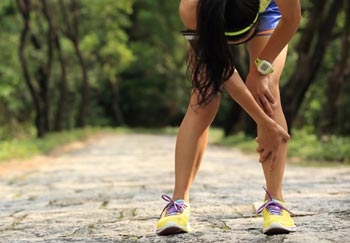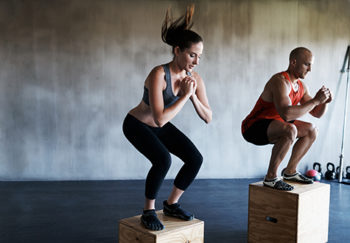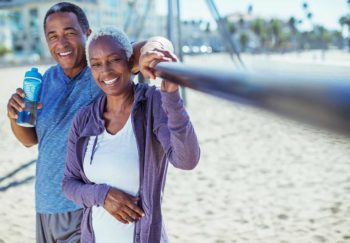
Muscle cramps affect almost all people who exercise at some point. As someone who used to do a lot of bicycle races, I have experienced severe muscle cramps from my fingers down to my toes. Luckily, they always went away after I downed some electrolytes and rested for a bit.
So, what causes muscle cramps? How do you know when the cramps are normal or maybe a sign of something worse? To find out, we got the answers to these questions and more from UVA sports medicine expert David Hryvniak, MD.
What Causes Muscle Cramps?
Muscle cramps occur when our muscles involuntarily contract and seize up. Severe muscle cramps can be extremely painful.
Hryvniak says, “There is no clear consensus on the cause of cramping, although there are some theories that dehydration and electrolyte depletion can increase your risk. Muscle cramps may originate from the neuromuscular level, which includes exercise-induced muscle damage and muscular fatigue.”
Many athletes tend to get severe muscle cramps if they:
- Don’t properly hydrate before an event
- Push themselves harder or longer than their bodies are used to
Severe Muscle Cramps: When to See a Doctor
Most muscle cramps are harmless and rarely lead to a visit to the doctor’s office. However, Hryvniak warns that frequent muscle pain or cramps accompanying numbness, tingling or weakness can be signs of more concerning things, such as:
- Chronic exertional compartment syndrome – associated with unusual pain, swelling, weakness, loss of sensation or soreness in muscles related to exercise or sports activities. It gets worse over time.
- Popliteal entrapment syndrome – the compression of the popliteal artery in your legs that reduces blood flow, most common in male athletes who do a lot of running
- Nerve compression
- Peripheral artery disease – the narrowing of arteries which reduces blood flow to your legs and causes pain when walking, most common in older adults
If your muscle cramps are becoming more painful or severe throughout an activity, they could also be an early sign of rhabdomyolysis. According to Hryvniak, this serious condition occurs when extreme exercise leads to significant muscle breakdown and even kidney failure.
In general, when muscle cramping or pain becomes a frequent problem in your exercise routine, it’s a good idea to talk to your doctor.
Preventing and Treating Muscle Cramps
Dealing with an injury or cramping?
The UVA Runner’s Clinic is the only clinic in the area with a program specifically for runners. The physicians are all experienced runners and board certified sports medicine physicians. They treat all physically active people with a special focus on the endurance athlete.
Make an appointment with the UVA Runner’s Clinic by calling 434.243.5600.
The best way to prevent severe muscle cramps is to stay well hydrated before, during and after exercise. This is especially important in the hot summer months. Stretching your legs before and after can also help.
“I also encourage people to make sure their training matches their goals. Don’t overreach in an event by starting too fast or going too long if you haven’t tried it in training,” says Hryvniak.
If you experience muscles cramps during an activity, he typically recommends:
- Take a short break
- Do some light stretching
- Hydrate with a sports drink
- Eat a salty snack
Muscle Cramps While Sleeping
Outside of exercise, it’s also common to get muscle cramps while sleeping or doing things around the home. These cramps often occur in the legs or feet.
You may be at a higher risk if you are:
- Dehydrated
- Older age
- Pregnant
- Diabetic or have liver or thyroid disorders
Most of Hryvniak’s advice applies in these situations as well. Stay well hydrated, do some light stretching and contact your doctor if the cramps start to become more frequent or severe.


I am 84 years old and I ;have severe cramping at night. especially after heavy labor during the day.
There must be some specific solutions beyond the general statements I see here!
I had cramping almost daily for years until I read on the internet that it might be a magnesium deficiency. I started taking magnesium supplements and the cramps went away.
I often would get leg cramps due to standing on cement floors to do my job.One night they were so severe I was outside trying to walk them off when my neighbour,who happened to be of Indian descent,advised me to put on a pair of socks and put wine cork in the socks,which she supplied.Amazingly the cramp was gone within seconds. I have since advised many people to do this,with excellent results. Remember to stay hydrated as that is really important too.Try it you’ll be surprised.
Night cramps are a result of Magnesium deficiency. I started taking a product called ReMag and it made all the difference.